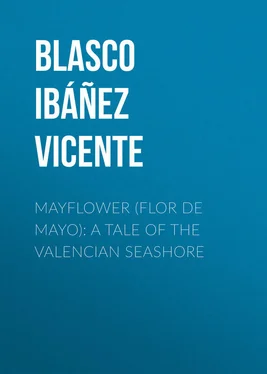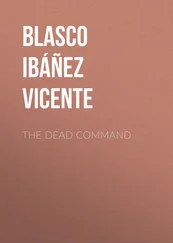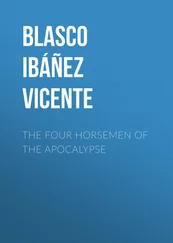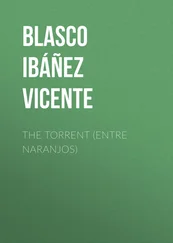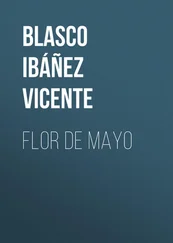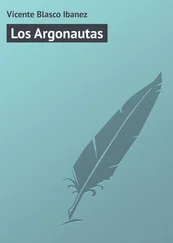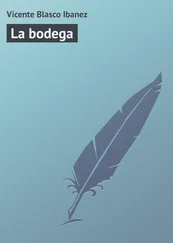Vicente Blasco Ibáñez - Mayflower (Flor de mayo) - A Tale of the Valencian Seashore
Здесь есть возможность читать онлайн «Vicente Blasco Ibáñez - Mayflower (Flor de mayo) - A Tale of the Valencian Seashore» — ознакомительный отрывок электронной книги совершенно бесплатно, а после прочтения отрывка купить полную версию. В некоторых случаях можно слушать аудио, скачать через торрент в формате fb2 и присутствует краткое содержание. Жанр: foreign_antique, foreign_prose, на английском языке. Описание произведения, (предисловие) а так же отзывы посетителей доступны на портале библиотеки ЛибКат.
- Название:Mayflower (Flor de mayo): A Tale of the Valencian Seashore
- Автор:
- Жанр:
- Год:неизвестен
- ISBN:нет данных
- Рейтинг книги:3 / 5. Голосов: 1
-
Избранное:Добавить в избранное
- Отзывы:
-
Ваша оценка:
- 60
- 1
- 2
- 3
- 4
- 5
Mayflower (Flor de mayo): A Tale of the Valencian Seashore: краткое содержание, описание и аннотация
Предлагаем к чтению аннотацию, описание, краткое содержание или предисловие (зависит от того, что написал сам автор книги «Mayflower (Flor de mayo): A Tale of the Valencian Seashore»). Если вы не нашли необходимую информацию о книге — напишите в комментариях, мы постараемся отыскать её.
Mayflower (Flor de mayo): A Tale of the Valencian Seashore — читать онлайн ознакомительный отрывок
Ниже представлен текст книги, разбитый по страницам. Система сохранения места последней прочитанной страницы, позволяет с удобством читать онлайн бесплатно книгу «Mayflower (Flor de mayo): A Tale of the Valencian Seashore», без необходимости каждый раз заново искать на чём Вы остановились. Поставьте закладку, и сможете в любой момент перейти на страницу, на которой закончили чтение.
Интервал:
Закладка:
His apprenticeship started auspiciously. Up to that time Pascualet had gotten along on the old clothes his father had left. But siñá Tona wanted him to begin his new trade with real dignity; so she closed the tavern, one afternoon, and went off to a ship chandler's bazaar at the Grao. The boy remembered the excitement of that visit to the stores for years and years. What gorgeous things, those blue coats, those yellow oilskins, those big rubber boots – only captains could afford them, surely! But he was proud, withal, of his own helper's outfit – two shirts of mallorquin, as stiff and prickly and rough as so much sand-paper, a sash of black wool, a set of glaring yellow overalls, a red cap to pull down over the back of his head in bad weather, and another of black silk to go ashore in. For once in his life he had on clothes that fitted him. He was through struggling with those old coats of his father that on blowy days filled like mainsails and made him trot down the wind in spite of himself. Shoes had been out of the question. Those nimble feet of his had never known the torment of a leather casing.
And a real calling it was that the boy felt for the sea. The boat of tio Borrasca was more to his taste than the grounded hulk on shore there with its grunting hogs and cackling hens. He worked hard; and to supplement his wages he got a few kicks from the old skipper, who could be gentle enough on land, but once with a deck under him would have made Saint Anthony himself toe the mark. He could run up the mast to set the lantern or clear a line as spryly as a cat. When the time came to chorrar , to haul the nets, he would take his hand at the ropes. He scrubbed the decks, stowed the baskets of fish in the hold, and kept the fires going in the galley, so that the men of the crew never had a chance to complain. And what luxuries in reward for all that enthusiasm! When the captain and the men were through eating, the leavings were for Pascualet and the other "cat," who had been standing by motionless and respectful during the meal. The two boys would sit down on the bow with black pots between their legs and loaves of bread under their arms. They would eat almost everything with their spoons, but when scooping became too slow, they would begin to mop the bottoms of the pots with crusts of bread till the metal was polished and shining. Then they would carefully collect the few drops of wine that the men had left in their tin cups. Finally, if there was no work to do, the "cats" would lie down like princes in the forecastle, their shirt-tails hanging out, their bellies toward the stars, their faces pleasantly tickled by the breeze, till they were rocked to sleep by the swaying of the vessel. There was tobacco a-plenty. Tio Borrasca was always raising a rumpus because he couldn't understand how his pockets ran empty so soon, now of the alguilla of Algiers, now of the Havana fine cut – according to the stock of the latest smuggler to make the Cabañal.
That was real life in Pascualet's eyes. Every time he came in, his mother could see that he had grown, was stronger, tanned a darker brown, but as good-natured as ever in spite of his fights with other "cats," husky little hectors who would stop at nothing, and who always puffed smoke in your face, when you talked to them, from pipes as big as they were.
These rapid visits home were all there was to remind siñá Tona that she had an elder son at all. The mistress of the tavern had something else on her mind. She was now spending entire days alone in her hulk there. "The Rector" was offshore, earning his share of cabets , returning only Sundays to hand over, with a show of pride, the three or four pesetas that represented his week's wage. The other boy, that lost soul Tonet, had turned out a regular waster – that was the very word for him. And he never came home unless he was hungry. He had joined the ragamuffins along shore, a swarm of wharf rats that knew no more about their fathers than the homeless dogs who went with them on their raids. He could swim like a fish, and all through the summer days he loafed around the liners in the harbor, without a stitch on his lean sunburned body, diving for the silver coins the passengers threw overboard. At night he would come home, his trousers in rags, his face scratched and bleeding. His mother had caught him several times fondly caressing the brandy keg; and one evening she had had to put on her shawl and go to harbor-police headquarters, where her tears and lamentations finally got him loose on the promise that she would cure him of his ugly weakness for scraping the bottoms of the sugar boxes stored on the piers.
That Tonet was a limb of the Devil! And, diós mio , where did he get it, where did he get it! How could two decent honest parents, such as she and Pascualo had been, ever get to have a boy like that? With a perfectly good dinner waiting for him at home, why did he insist on sneaking around the steamers from Scotland, waiting for the watchman to turn his back so as to be off with a dried codfish under his arm? No, that boy was to be the death of her! Twelve years old, no inclination to work, and not the slightest fear or respect for her, in spite of all the broomsticks she had broken over his back.
Siñá Tona usually confided her troubles to a certain Martinez, a young policeman who patrolled that part of the shore, spending the noon hours under the café shelter, his rifle across his knees, his eyes vaguely fixed on the horizon of the sea, and his ears filled with the running plaint of the tavernkeeper. A handsome chap Martinez was, an Andalusian from Huelva, slender and trim of person, natty as could be in the old service uniform which he sported with a truly martial swagger, twirling the corner of his blond mustache with an air that people called "distinguished." Siñá Tona admired the man. After all, breeding will come out! You can tell it a mile away. How Martinez talked, for instance! You could see from his choice of words that he was a man of schooling. For that matter he had studied years and years in the Seminary up his way; and if now he was only a patrolman, it was because he hadn't wanted to be a priest – he had quarreled with his family on the subject – preferring to see a bit of the world by enlisting in the army. The mistress of the tavern listened open-mouthed to the tales he told about himself in a heavy Andalusian dialect where every "s" was like "th" in "thing." In deference to his learning, she answered in kind, floundering about in an absurd and unintelligible Castillian which made people in the village laugh.
"See, siñor Martines , that jacknape of mine is driving me mad with all his carrying on. I say to him, I say: 'Anything wrong in this house, jail-bird? Well, then, why go tearing around with that gang of good-for-nothings, who will die at the end of a rope, every one of them!' now osté siñor Martines , you know how to talk in good grammar. You just tell him what is what. You tell him they'll put him in the lock-up at Valencia if he isn't a good boy."
And siñor Martines promised to take the little rogue in hand, and he did, in fact, give him a lecture, which reduced Tonet, for a moment at least, to cowering in terror in the presence of that uniform and that heavy gun, which the soldier would never let go of for an instant. These slight favors gradually brought Martinez into the family, making his relations with siñá Tona more and more intimate. He got his meals now at the tavern, and spent most of his time there; and the mistress finally had the pleasure of darning his stockings and sewing the buttons on his underwear. Poor siñor Martines ! What would happen to a fine young man like him without a woman around? He would get to be as shabby and disreputable as a stray cat. And, frankly, no decent lady could allow that to happen!
Читать дальшеИнтервал:
Закладка:
Похожие книги на «Mayflower (Flor de mayo): A Tale of the Valencian Seashore»
Представляем Вашему вниманию похожие книги на «Mayflower (Flor de mayo): A Tale of the Valencian Seashore» списком для выбора. Мы отобрали схожую по названию и смыслу литературу в надежде предоставить читателям больше вариантов отыскать новые, интересные, ещё непрочитанные произведения.
Обсуждение, отзывы о книге «Mayflower (Flor de mayo): A Tale of the Valencian Seashore» и просто собственные мнения читателей. Оставьте ваши комментарии, напишите, что Вы думаете о произведении, его смысле или главных героях. Укажите что конкретно понравилось, а что нет, и почему Вы так считаете.
